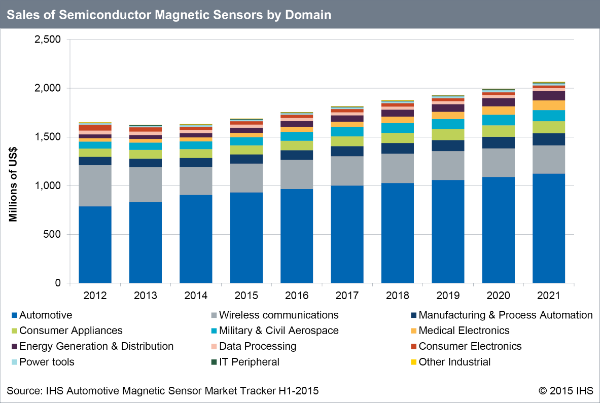Led by ongoing price erosion in the electronic compass sensor market, year-over-year semiconductor-based magnetic sensor revenues grew less than 1 percent in 2014; however, the industry's growth rate is on track to reach nearly 4 percent in 2015. The overall magnetic sensor market's declining growth has been mitigated by the automotive sensor market last year, which comprises more than half (55 percent) of the overall market for magnetic sensors, according to IHS Inc. (NYSE: IHS), the leading global source of critical information and insight.

“Once the rising star of the magnetic sensor market, 3-D magnetometer compass sensors have quickly entered a plateau dominated by commoditization,” said Richard Dixon, Ph.D., principal analyst for MEMS and sensors at IHS Technology. “Many magnetic sensor suppliers focused on compasses, which are used in GPS-enabled smartphones and tablets, are seeing their market shrink before their eyes, while those serving the automotive sector continue to bolster their revenue.”
Since the introduction of electronic compass sensors in 2008, increased competition and resulting lower prices have led to a sharp reduction in profit margins for the sector. At that time, a three-axis compass was priced at around $1.40. Today, the price of a magnetometer used in a GPS-enabled mobile phone at large volume OEMs is already under $0.20 and is set to fall even further over the next five years.
Following are the three main reasons for the decline of the magnetic electronic compass market, according to the IHS Magnetic Sensors Market Tracker:
1. Low penetration of compasses in the low-end smartphone market. Unlike the accelerometers that are used for portrait-landscape orientation, 3-D magnetometers are an elective feature, not a requirement. "3-D compass penetration rate is high in mid-range smartphones and saturated in high-end smartphones," Dixon said. "Unfortunately these markets no longer drive growth."
2. Price erosion. Asahi Kasei Microdevices (AKM) has maintained a strong hold on the market for 3-D magnetometers since 2008, and the company still boasts the industry's least expensive software implementation. "Samsung and other large customers buying in large quantities have subsequently forced the price down to a point that no other supplier can compete with; however, an aggressive pricing policy has also been pursued by Yamaha and other companies, which has added to the rapid commoditization of the market," Dixon said.
3. Some long-touted applications have not emerged. "Just a few years ago, indoor navigation and augmented reality promised to drive the market requirement for more accurate sensors, including magnetometers with higher angular resolution," Dixon said. "This market requirement has not materialized, and with it, any requirement for higher performance devices would command a higher price."
Shrinkage in the compass sensor market has been offset by growth in the automotive sector, which remains a key growth sector of the magnetic sensor market. Sensor penetration is still increasing in mature markets like North America, Europe and Japan. China and other emerging markets, for which the bulk of vehicles have relatively low electronics content today, are rapidly adding more sensors for improved safety, greater comfort and better fuel economy.


